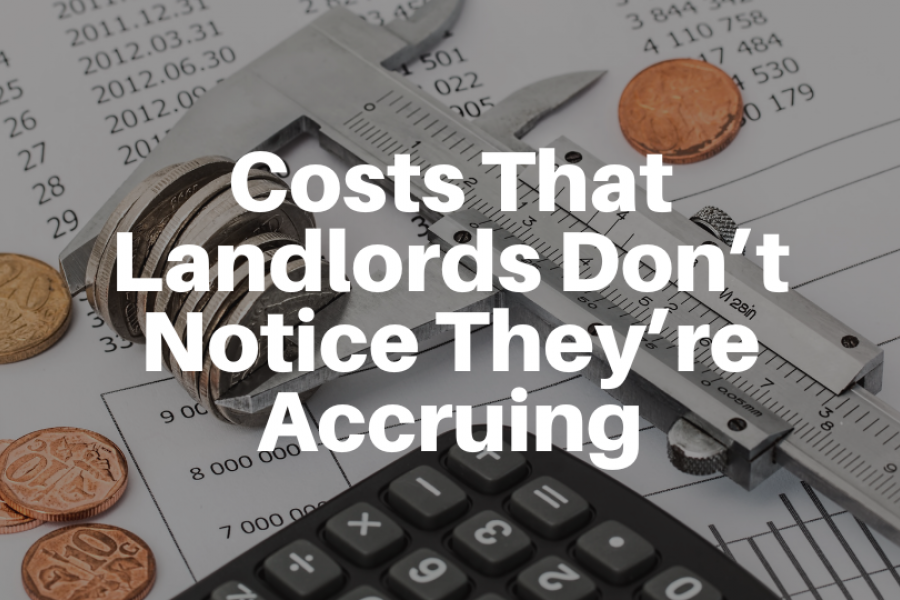Costs That Landlords Don’t Notice They’re Accruing

Landlords often focus on the obvious costs associated with property management, like mortgages, taxes, and insurance. However, several hidden or less apparent expenses can significantly impact the profitability of their rental investments. These overlooked costs, if not managed wisely, can silently erode the net operating income (NOI) and reduce the overall revenue potential of your rental.
As a landlord, understanding and controlling these costs is crucial for maintaining a healthy bottom line in the rental business. Being aware of these often-unnoticed costs offers insights and strategies to effectively manage and mitigate them, thereby enhancing your investment's profitability and longevity.
Here are the common costs that landlords often ignore:
Maintenance Costs
Often underestimated, routine and emergency maintenance can rapidly escalate expenses. Landlords should schedule regular inspections and address minor issues promptly to prevent them from escalating into costly repairs.
Examples include fixing leaky faucets before they lead to water damage or addressing minor electrical issues before they become hazardous.

Legal Fees
Legal expenses, especially in situations involving evictions or lease disputes, can accumulate without notice. To manage these costs, landlords should work with experienced legal professionals, understand billing practices, and strive to reduce legal interventions by improving tenant screening processes.
Poor Quality Residents
Inadequate tenant screening can lead to substantial costs related to property damage, late payments, and legal expenses. Landlords should rigorously check potential tenants' backgrounds, including rental history, employment verification, and criminal records, to avoid these issues.
Vendors and Contractor Payables
Costs associated with vendors and contractors can increase unexpectedly due to price hikes or hidden charges. Landlords should vet their service providers carefully, negotiate rates, and ensure transparent billing to control these costs.
Lengthy Vacancies
Extended vacancies lead to a loss of rental income and additional expenses like utilities and taxes. To minimize these costs, landlords should keep properties in good condition, set competitive rent prices, and employ effective marketing strategies.
Other Costs That You Need to Be Mindful Of
Aside from what was mentioned above, there are also other costs that rental property owners need to be aware of, such as the following:
-
Insurance Premiums: Insurance costs can fluctuate based on various factors like property location, type of coverage, and claim history. Regularly reviewing and comparing insurance policies can help landlords find the most cost-effective coverage for their properties.
-
Utility Costs During Vacancies: Landlords may overlook utility costs during vacancies. It's essential to monitor and minimize utility use during these periods to avoid unnecessary expenses.
-
Property Tax Increases: Property taxes in Denver can increase due to various factors such as reassessments or rate changes. Staying informed about local tax regulations and appealing assessments when appropriate can help manage these costs.
-
Administrative and Operational Expenses: Costs related to property management, bookkeeping, and administrative tasks can add up. Efficient organization and possibly outsourcing some of these tasks can help reduce these expenses.
-
Capital Improvements and Upgrades: Capital improvements are necessary for property value preservation but can be costly. Planning and budgeting for these improvements over time can help spread out the expenses.
-
Technology and Software Costs: Investment in property management software and other technologies can streamline operations but also lead to recurring costs. Evaluating the return on investment for these technologies is crucial to ensure they are cost-effective.

Risks of Overspending
Overspending in property management can have several detrimental effects on a landlord's investment portfolio. These risks include:
-
Decreased Property Value: Neglecting maintenance due to cost concerns can lead to property degradation, negatively impacting its market value.
-
Tenant Dissatisfaction: Poorly managed properties due to cost-cutting can lead to tenant dissatisfaction, resulting in higher turnover rates and increased vacancy costs. Your primary focus should be keeping your renters happy.
-
Reduced Cash Flow: Excessive expenses diminish the net income from rental properties, affecting the landlord's ability to cover mortgage payments and other financial obligations.
-
Loan Default Risk: Consistently high expenses can strain the landlord's financial resources, increasing the risk of loan defaults and potential foreclosure.
-
Lower Return on Investment (ROI): Overspending reduces the ROI, making the investment less profitable than initially projected.
-
Legal and Compliance Issues: Ignoring legal and regulatory requirements to save costs can lead to legal penalties, lawsuits, and reputational damage.
By understanding and managing these risks, you can safeguard your investments and ensure long-term profitability and sustainability of your rental properties.
How Can Property Managers Help?
Property managers play a vital role in helping landlords manage and reduce unnoticed costs. By leveraging the skills and resources of property managers, you can significantly reduce the hidden costs associated with property ownership and improve your investment's overall performance.

The expertise and experience or professional property managers in the rental market can be invaluable in several ways:
-
Regular Maintenance and Inspections: Property managers ensure timely maintenance and regular inspections, catching minor issues before they escalate into expensive repairs.
-
Effective Tenant Screening: They employ rigorous tenant screening processes to find reliable tenants, reducing the risks of property damage and legal disputes.
-
Legal and Regulatory Compliance: Property managers stay on top of legal and regulatory changes, helping landlords avoid costly legal fees and penalties.
-
Vendor Management: They often have established relationships with contractors and vendors, ensuring quality work at competitive prices and preventing unexpected cost escalations.
-
Vacancy Management: Property managers employ effective marketing strategies to minimize vacancy periods, thereby maximizing rental income while ensuring that your property gets occupied as soon as it becomes available.
-
Financial and Administrative Efficiency: By handling administrative tasks, bookkeeping, and financial management, property managers can streamline operations and reduce administrative costs.
-
Strategic Advisory: Experienced property managers can provide strategic advice on property improvements and investments, helping landlords make informed decisions that increase property value and rental income.
Conclusion
Being a successful landlord goes beyond just collecting rent and managing the day-to-day operations of a property. It requires a keen awareness of the various hidden costs that can accrue without notice, significantly affecting profitability.
By understanding these costs, from maintenance to legal fees, and employing strategies to mitigate them, landlords can protect their investments. Being proactive in managing these costs and understanding the risks of overspending is crucial for long-term success in the rental property market.
Ultimately, careful management of these aspects ensures a healthier bottom line and a more sustainable investment strategy.
Property managers can be invaluable in this process, providing expertise in areas like tenant screening, maintenance, and financial management. If you need help, call our experts at Evolve Real Estate and Property Management and we’ll be happy to assist you!
